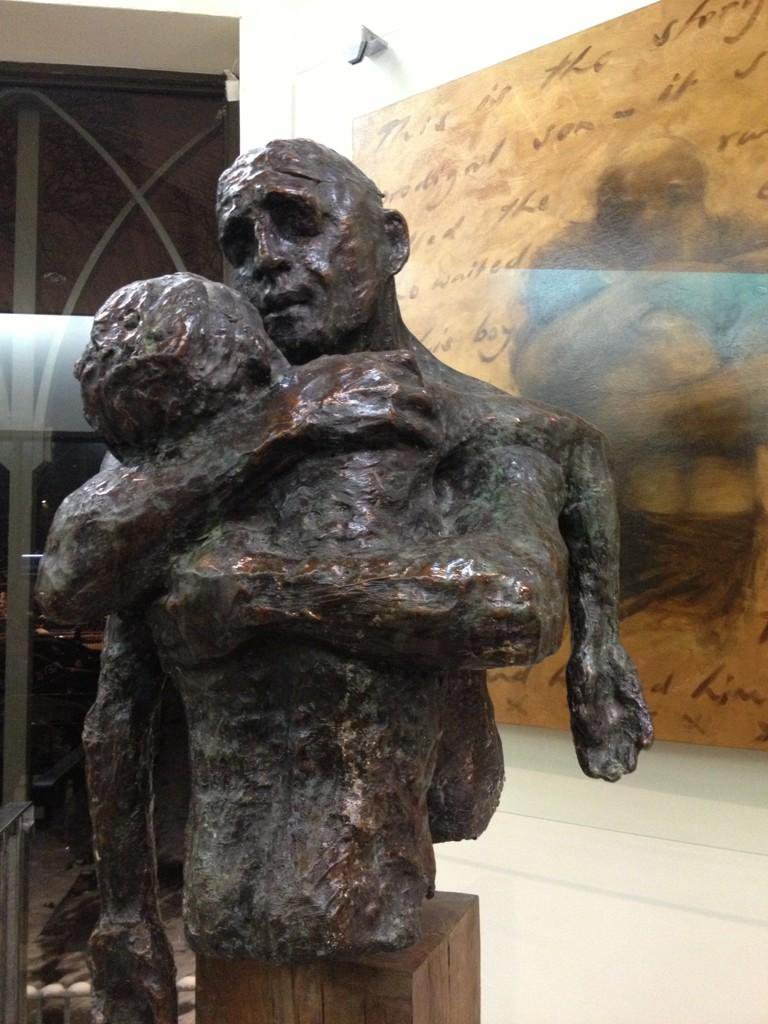Jan’s book, Circle of Grace, must be one of my favorite books of poetry. This Sunday poem is from another of her books, The Cure for Sorrow: A Book of Blessings for the Seasons.
Category: forgiveness
If any one of you feels guilty
“If any one of you feels guilty and you know that you deserve it, fear not. Look at Jesus Christ. You only need to say, ‘Have mercy on me.’ Then, with the eyes of faith . . . see an unseen hand wipe out all your sins and misdemeanors. You will realize you are in paradise because he who is merciful dwells in you. Where he is, there is paradise. It is as simple as that. …

“Faith assures us that when we come close to God with sorrow in our heart, his consuming fire cleanses everything in us. His arms reach out and take us in and rock us back and forth. We rest against his breast and are lulled by the heartbeats of God.” (Servant of God Catherine de Hueck Doherty)
Only by the help of the Holy Spirit
Worth the watch:
In falling and rising again
“If there is anywhere on earth a lover of God who is always kept safe, I know nothing of it, for it was not shown to me. But this was shown: that in falling and rising again we are always kept in that same precious love.”
― Julian of Norwich
Unbinding
Following up on yesterday’s post:
“Several years ago a television documentary followed the family of a young woman who had been brutally murdered. Her murderer was eventually caught, convicted, and sentenced to death for the horrible crime. The victim’s father was given permission to witness the execution, which he was certain would give him satisfaction and peace. In a press conference held after the execution, the father was asked if it was all he hoped it would be. He answered, ‘Absolutely!’ He paused and added, ‘My only regret is that I can’t watch him die again every day for the rest of my life.’ My heart sank watching this poor man who had been robbed of so much. The execution did not give him back his daughter, and would never give him the peace he so desperately needed. Jesus’ command to be overly generous in forgiving those who have hurt us deeply is really an invitation to freedom. The Greek word used in the New Testament that we usually translate as ‘forgive’ can also be translated as ‘unbind’. When we forgive another person, we are unbinding him or her from some past sin or hurt–but, often enough, the other person either will not or cannot receive the gift. However, the act of forgiveness always unbinds and sets free our hearts as nothing else can.” (Fr. Richard G. Smith)
He tells us: “Come out!”
 “Before the sealed tomb of his friend Lazarus, Jesus “cried with a loud voice, ‘Lazarus, come out.’ The dead man came out, his hands and feet bound with bandages, and his face wrapped with a cloth” (11:43-44). This commanding cry is addressed to every man, because we are all marked for death, all of us; it is the voice of he who is the Lord of life and desires that all “have it in abundance” (John 10:10). Christ has not resigned himself to the tombs that we have created with our choices of evil and death, with our mistakes, with our sins. He does not resign himself to this! He invites us, he almost commands us, to come out of the tombs in which our sins have buried us. He insistently calls us out of the darkness of the prison in which we have shut ourselves, contenting ourselves with a false, egoistic and mediocre life. “Come out!” he tells us, “Come out!” It is a beautiful invitation to true freedom, to let ourselves be seized by these words of Jesus that he repeats to each one of us today. It is an invitation to remove the “burial shroud,” the burial shroud of pride. Pride makes us slaves, slaves to ourselves, slaves of many idols, of many things. Our resurrection begins here: when we decide to obey this command of Jesus, going out into the light, into life; when the masks fall from our face – often we are masked by sin, the masks must fall! – and we rediscover the courage of our true face, created in the image and likeness of God.” (Pope Francis)
“Before the sealed tomb of his friend Lazarus, Jesus “cried with a loud voice, ‘Lazarus, come out.’ The dead man came out, his hands and feet bound with bandages, and his face wrapped with a cloth” (11:43-44). This commanding cry is addressed to every man, because we are all marked for death, all of us; it is the voice of he who is the Lord of life and desires that all “have it in abundance” (John 10:10). Christ has not resigned himself to the tombs that we have created with our choices of evil and death, with our mistakes, with our sins. He does not resign himself to this! He invites us, he almost commands us, to come out of the tombs in which our sins have buried us. He insistently calls us out of the darkness of the prison in which we have shut ourselves, contenting ourselves with a false, egoistic and mediocre life. “Come out!” he tells us, “Come out!” It is a beautiful invitation to true freedom, to let ourselves be seized by these words of Jesus that he repeats to each one of us today. It is an invitation to remove the “burial shroud,” the burial shroud of pride. Pride makes us slaves, slaves to ourselves, slaves of many idols, of many things. Our resurrection begins here: when we decide to obey this command of Jesus, going out into the light, into life; when the masks fall from our face – often we are masked by sin, the masks must fall! – and we rediscover the courage of our true face, created in the image and likeness of God.” (Pope Francis)
Thy Mercy Free
Out of the depths we cry to thee.
Lord, hear us, we implore thee.
Bend down thy gracious ear to us.
Let our prayer come before thee!
On our misdeeds in mercy look
O deign to blot them from thy book,
And let us come before thee.
Thy sov’reign grace and boundless love
Show thee, O Lord, forgiving.
Our purest thoughts and deeds but prove
Sin in our hearts is living.
None guiltless in thy sight appear.
All who approach thy throne must fear,
And humbly trust thy mercy.
Thou canst be merciful while just.
This is our hope’s foundation.
In thy redeeming grace we trust.
O grant us thy salvation.
Upheld by thee we stand secure.
Thy word is firm, thy promise sure,
And we rely upon thee.
Like those who watch for midnight’s hour
To hail the dawning morrow,
We wait for thee, we trust thy pow’r,
Unmoved by doubt or sorrow.
So let thy people hope in thee,
And they shall find thy mercy free,
And thy redemption plenteous.
Martin Luther
Do not despair
“Our gracious Lord does not wish His servants to despair
because of frequent or grievous falling,
because our falling does not prevent Him from loving us.”
(Julian of Norwich)
Isn’t this the Good News?
O hope of every contrite heart
One of my favorite hymns: Jesus the very thought of thee by St. Bernard of Clairvaux. Take a moment and listen, letting it refresh your heart.
Something to think about . . .
What e’er the soul has felt or suffered long,
Oh, heart! this one thing should not be forgot:
Christ washed the feet of Judas.
~George Marion McClellan
from “The Feet of Judas” in The Book of American Negro Poetry 1922
As an aide in a rest home caring for the crippled feet of the elderly,
as a medical student in an inner city hospital seeing the homeless whose socks had to be peeled off carefully to avoid pulling off gangrenous toes, as a doctor working with the down and out detox patients from the streets who had no access to soap and water for weeks,
I’ve washed feet as part of my job.
People always protest, just as Peter did when Jesus started to wash his feet.
We never believe our feet,
those homely gnarled bunioned claw-toed calloused parts of us,
deserve that attention.
We are ashamed to have someone…
View original post 107 more words
